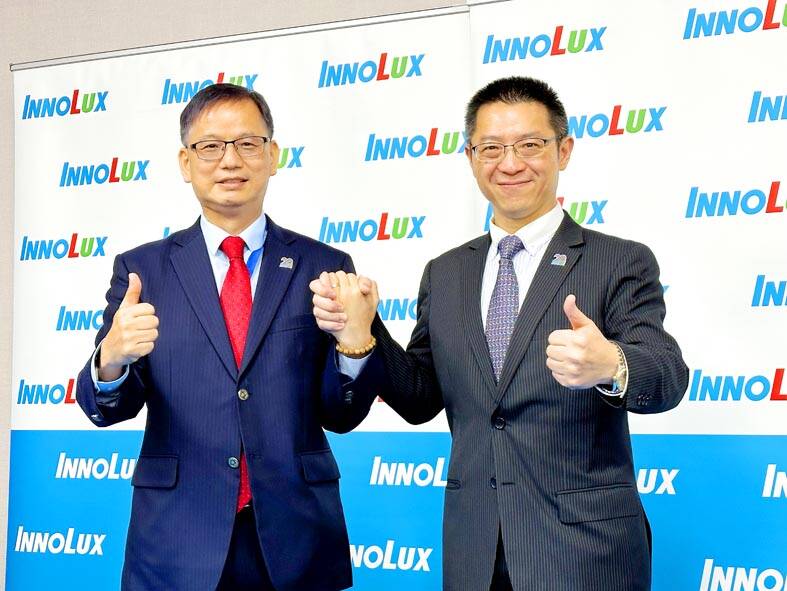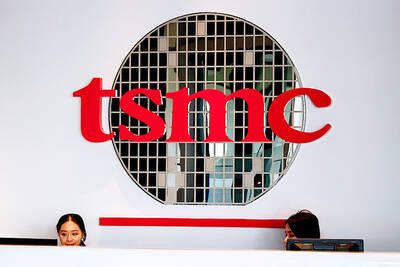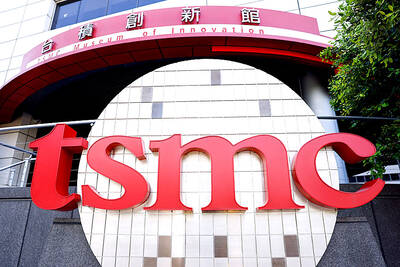LCD panel maker Innolux Corp (群創) yesterday reported an eight-quarter losing streak due to reduced working days from the Lunar New Year holidays and slack seasonality last quarter.
Losses widened to NT$4.1 billion (US$126 million) from NT$3.24 billion in the fourth quarter last year. Compared with the same period last year, losses have narrowed significantly from NT$7.77 billion.
Innolux’s average selling price dropped for the third consecutive quarter to US$263 per unit last quarter, sliding about 2.23 percent from US$269 in the fourth quarter last year.

Photo: Chen Mei-ying, Taipei Times
Innolux said the prices of TV panels climbed last quarter, benefiting from restocking demand as major sports games, including the Paris Olympics and UEFA Euro, are set to take place in the second half of this year.
Gross margin improved to 4.2 percent last quarter from 3.4 percent in the third quarter and minus- 7 percent in the first quarter of last year. Revenue shrank 5 percent quarter-on-quarter, but rose 11 percent year-on-year, to NT$50.49 billion in the first quarter.
“With the world’s three major sports events approaching, [TV vendors’] new product launches and China’s 618 promotion activities should stimulate panel demand during the second quarter,” it said yesterday, adding that factory utilization and production efficiency would be enhanced to match market changes and customer demand.
Large-sized panels, mostly used in TVs and computers, are expected to grow about 13 or 14 percent this quarter, while the average selling prices for those panels would climb about 5 percent sequentially this quarter, it said.
However, shipments of its small and medium-sized panels used in smartphones and cars are expected to drop about 7 or 8 percent on a quarterly basis, it added.
Innolux’s board of directors has approved a capital spending budget of NT$21 billion for this year, slightly lower than last year’s NT$22.5 billion.
It is accelerating its transformation efforts to expand into advanced chip packaging, auto displays and other new businesses beyond flat panels, Innolux said, adding that non-display products made up 28 percent of the company’s total revenue last year.
Innolux’s board of directors also approved a NT$10.89 billion capital reduction by canceling 1.089 billion shares, a 12 percent reduction of its total capital shares, it said, adding that the company would return NT$1.2 per share to shareholders.
After the latest adjustment, Innolux would have 7.99 billion in capital shares.

Chizuko Kimura has become the first female sushi chef in the world to win a Michelin star, fulfilling a promise she made to her dying husband to continue his legacy. The 54-year-old Japanese chef regained the Michelin star her late husband, Shunei Kimura, won three years ago for their Sushi Shunei restaurant in Paris. For Shunei Kimura, the star was a dream come true. However, the joy was short-lived. He died from cancer just three months later in June 2022. He was 65. The following year, the restaurant in the heart of Montmartre lost its star rating. Chizuko Kimura insisted that the new star is still down

While China’s leaders use their economic and political might to fight US President Donald Trump’s trade war “to the end,” its army of social media soldiers are embarking on a more humorous campaign online. Trump’s tariff blitz has seen Washington and Beijing impose eye-watering duties on imports from the other, fanning a standoff between the economic superpowers that has sparked global recession fears and sent markets into a tailspin. Trump says his policy is a response to years of being “ripped off” by other countries and aims to bring manufacturing to the US, forcing companies to employ US workers. However, China’s online warriors

Taiwan Semiconductor Manufacturing Co (TSMC, 台積電) listed the challenges of ensuring export control compliance by its customers, months after the company’s artificial intelligence (AI) silicon was found to have flowed to US-sanctioned Huawei Technologies Co (華為) via intermediaries. “TSMC’s role in the semiconductor supply chain inherently limits its visibility and information available to it regarding the downstream use or user of final products that incorporate semiconductors manufactured by it,” the Hsinchu-based company said in its latest annual report released on Friday. The world’s largest contract chipmaker said the constraint impedes its ability to prevent unintended end-uses of its semiconductors, as well

Taiwan Semiconductor Manufacturing Co (TSMC, 台積電) expects steady growth this year despite global economic uncertainty due to continued momentum from tech trends such as 5G, artificial intelligence (AI) and high-performance computing (HPC) applications. In the company’s annual shareholders’ report released on Thursday, TSMC chairman and CEO C.C. Wei (魏哲家) said the company is well-positioned to meet market demand with its differentiated technology platforms. The company’s 2-nanometer process is on track for volume production in the second half of this year, while its next-generation nanosheet-based A16 process, aimed at HPC applications, is scheduled for mass production late next year, Wei said. Advanced technologies —